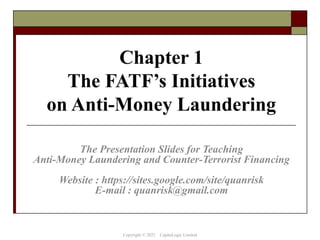Paris, 18 December 2024 – Argentina has strengthened its laws and processes on anti-money laundering and countering the financing of terrorism (AML/CFT) since its previous mutual evaluation (2010) which highlighted substantial gaps in compliance. However, Argentina faces shortcomings in delivering effective outcomes, apart from cooperation with international partners where it is achieving positive results. The […]

Paris, 18 December 2024 – Argentina has strengthened its laws and processes on anti-money laundering and countering the financing of terrorism (AML/CFT) since its previous mutual evaluation (2010) which highlighted substantial gaps in compliance.
However, Argentina faces shortcomings in delivering effective outcomes, apart from cooperation with international partners where it is achieving positive results.
The joint FATF/GAFILAT mutual evaluation of Argentina assessed the effectiveness of Argentina’s measures to combat money laundering, terrorist financing and proliferation financing, and their level of compliance with the FATF Recommendations, at the time of the on-site visit in March 2024.
An upper-middle income country, Argentina faces money laundering risks primarily from domestic threats such as drug trafficking, tax evasion, corruption, smuggling, fraud, and human trafficking.
Argentina must improve its money laundering (ML) and terrorist financing (TF) risk understanding, in particular laundering from corruption and through informal financial services. Argentina must also increase prosecution of money laundering and improve confiscation in line with its risk profile. Although Argentina has invested significant efforts to enhance the identification, prosecution, and conviction of money laundering and achieved some positive convictions over the review period, the 91 convictions secured is a relatively low number given the size and context of Argentina and although authorities secured confiscations in almost all cases, amounts are modest.
On terrorist financing, Argentina has a generally adequate regulatory framework, but the limited number of investigations, lack of prosecutions and the absence of convictions is not entirely consistent with the country’s medium-low risk profile and should improve.
Argentina demonstrates strengths in domestic cooperation and coordination between agencies, with public prosecutors and investigative judges using financial intelligence from a broad range of sources. The report provides recommendations to protect the operational independence of the Financial Intelligence Unit (FIU).
Issues were also identified with suspicious transaction reporting from high-risk sectors such as securities, real estate and virtual asset service providers, limited use of intelligence from cross-border cash movements, and low levels of terrorist financing-related intelligence.
In terms of international cooperation, Argentina provides constructive legal assistance and extradition and provides different types of international cooperation, with only some areas for improvement.
Argentina has a well-designed AML/CFT supervision framework. While the supervision is risk-based to some extent, it is not achieving greater effectiveness because of serious human and information technology (IT) resource constraints, especially in the case of the FIU. Financial institutions were found to have an overall good understanding of money laundering risks but an uneven understanding of terrorist financing risk.
Overall, ‘gatekeeper professions’ such as lawyers, accountants, trust and company service providers, and real estate agents (Designated Non-Financial Businesses and Professions) understand their main ML/TF risks in line with Argentina’s National Risk Assessments. However, the understanding of sector-specific ML/TF risks within the respective sectors is uneven, and at times limited.
On non-profit organisations (NPOs), Argentina should take a more risk-based approach to mitigating the risk of abuse of NPOs, in line with Recommendation 8 of the FATF Standards, so as not to unduly disrupt or discourage legitimate NPO activities.
Following the assessment, Argentina is placed on “enhanced follow-up” and will report back to the FATF in one year.













